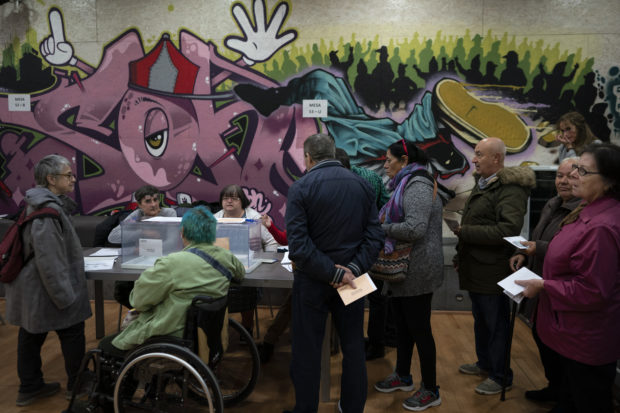MADRID – Early results in Spain’s national election show the ruling Socialists leading the count and the far-right Vox party surging, as Spain’s political divide widens between left and right, further exacerbating the country’s political deadlock.

People line up in a polling station to cast their vote for the general election in Barcelona, Spain, Sunday, Nov. 10, 2019. Spain holds its second national election this year after Socialist leader Pedro Sanchez failed to win support for his government in a fractured Parliament. (AP Photo/Felipe Dana)
The far-right Vox party, which only got into the national parliament in April, looks now to become the country’s third-largest political force, according to results with 70% of the votes counted.
Incumbent Prime Minister Pedro Sánchez’s Socialists would win 122 parliamentary seats, one less than in the April election, the early results show. That leaves them further away from the needed 176-seat majority, even with the support of its natural left-wing ally, the anti-austerity United We Can party, which shed 7 seats to 35.
The conservative Popular Party, now leader of the opposition, is poised to recover from the 66 seats it won in April — a historical low — to have 84 lawmakers after Sunday’s vote.
The far-right Vox would more than double its current presence in the Congress of Deputies, from 24 to 53 seats.
The biggest loser of the election would be the center-right Citizens party, plunging to 10 seats from 57 in the last ballot.
The entire 350-seat lower house and 208 senators were elected Sunday, chosen by Spain’s 37 million eligible voters. Spain’s four main parties had focused their campaigns on how to deal with the independence push in the northeastern region of Catalonia.
In a last-minute effort earlier Sunday, United We Can party leader Pablo Iglesias offered to help Sánchez’s Socialists, hoping to form a stable leftist coalition. Sunday’s election was called after the two parties failed to agree following the last election in April.
“We think that combining the courage of United We Can and the experience of the Socialist party we can convert our country into a reference point for social policies,” Iglesias said.
But Vox has already joined forces with Spain’s two right-of-center parties to take over many city and regional governments. Those three groups would readily band together to oust Sánchez, who is seen by the right-wing opposition as too soft on the Catalan secessionist movement.
Julia Giobelina, a 34-year-old web designer from Madrid, was angry at having to vote for the second time in less than seven months but said she cast her ballot in hopes of stopping the rise of Vox.
“They are the new fascism,” Giobelina said. “We citizens need to stand against privatization of health care and other public services.”
Spain returned to democracy in the late 1970s after a near four-decade right-wing dictatorship under the late Gen. Francisco Franco. The country used to take pride in claiming that no far-right group had seats in the national parliament, unlike the rest of Europe. The Socialists’ victory in April was also seen by many as a respite for Europe, where right-wing parties had gained much ground.
But Vox, headed by Santiago Abascal, appears to have capitalized on Spanish nationalist sentiment stirred up by the Catalan conflict. Many right-wingers were also not pleased by the Socialist government’s exhumation of Franco’s remains l ast month from his gargantuan mausoleum so he could no longer be exalted in a public place.
Dozens of people on Sunday cheered and shouted “President! President!” as Abascal voted in Madrid.
“Only by getting rid of Sánchez we can preserve Spain as it is, not by reaching agreements with the (Catalan) separatists,” said Alfonso Pedro Monestilla, a 59-year-old civil servant who voted for Vox.
Just as there is no solution to Spain’s political deadlock, there appears to be no easy resolution for Catalonia’s independence movement.
Last month, Spain’s Supreme Court sentenced to prison nine Catalan politicians and activists who led a 2017 drive for the region’s independence. The ruling triggered massive daily protests in Catalonia that left more than 500 people injured, roughly half of them police officers, and dozens arrested. More protests by radicals have been called for this week. /gsg